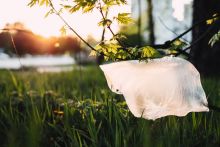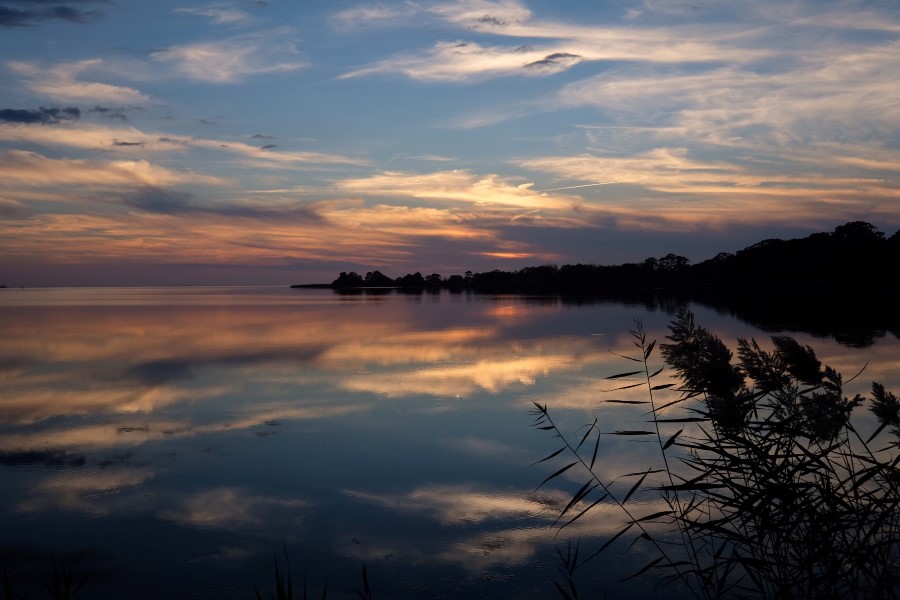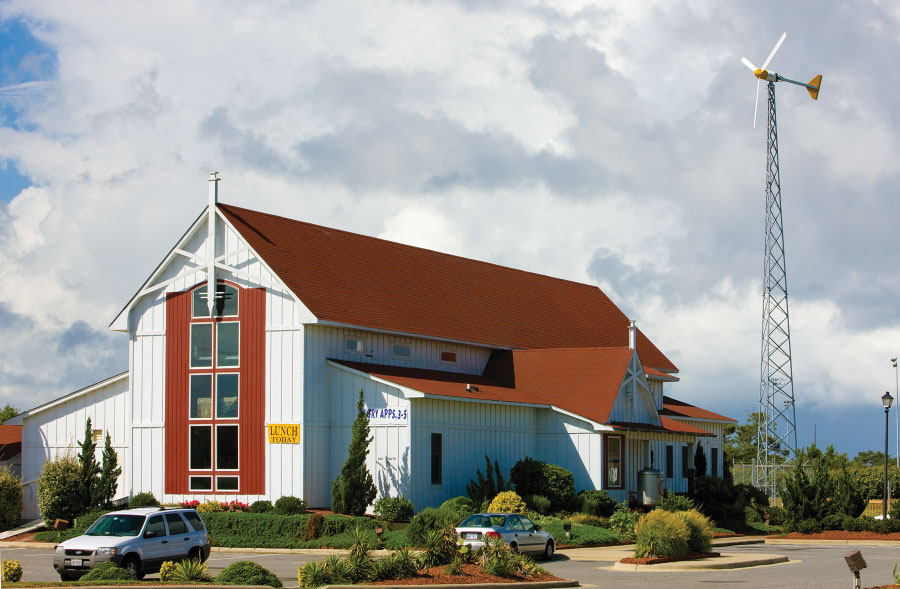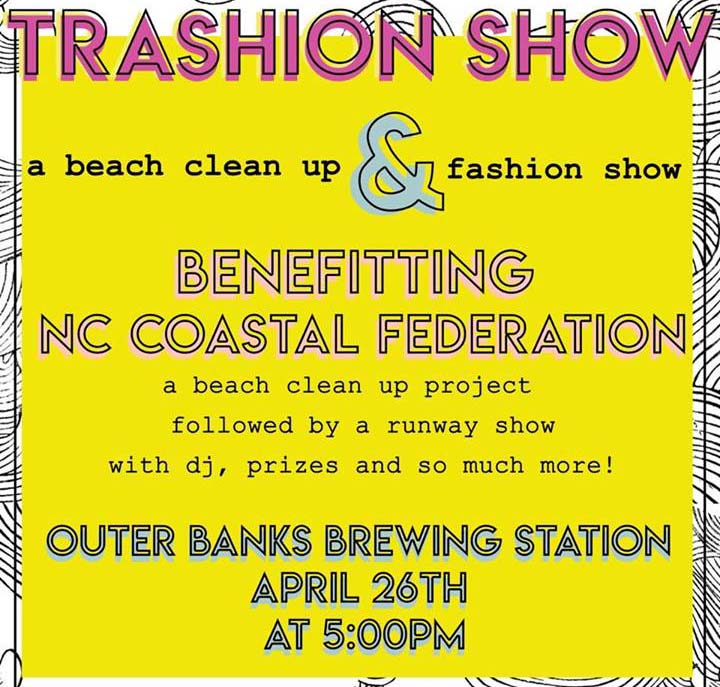
Airborn bags blow overhead like balloons, cellophane gets tangled up in sea oats, plastic wrappers and debris float like seaweed in the ocean. We encounter these sights all too often on the Outer Banks, and they have no business dirtying the beautiful environment around us.
A couple weeks ago, I wrote a blog describing my frustration with trash left on the beach, and it got many of you talking in our comments section and on Facebook. In the spirit of Earth Day this week and because people seem eager to engage with a rant about issues facing the Outer Banks, I’m here and ready to vent about single-use plastics.
Seeing plastic pollution disappoints me, and it also infuriates me at another level. How many of us have hopelessly chased a rogue bit of plastic, only to watch the wind or water current sweep it away before we retrieve it? Then we’re left knowing that that bit of plastic will get caught in a tree, eaten by a turtle or pose some other threat to nature for the next 1,000 years.
That said, I can only rant but so much … I carry plenty of blame myself for not helping the problem. Sometimes when I can’t find a recycling bin, I’ll sheepishly sidle up to a trash can and tuck paper, cans or plastic bottles in with the rest of the rubbish. Or I’ll just shake my head and keep walking when I find plastic straws left on the beach, sticking up out of the sand like a little monument of litter. And I have no problem reaching for the occasional plastic fork when I’m too lazy to do the dishes.

Photo credit: Celeste Osorio
Now that I’ve outed myself, I suspect that almost everyone contributes to the prevalence of single-use plastics in some way or another. Maybe it’s with the occasional bottle of water, losing a plastic bag on a windy day or getting a take-out meal that comes with an unmentioned side of Styrofoam boxes, plastic utensils and plastic bags too. We all share this problem facing our Outer Banks environment, and that also means that we can change it. All we have to do is take a few steps to (further) reduce how we use plastic. And it can be just as simple as choosing paper bags over plastic at the checkout line or enjoying your beverage without the straw.
Until recently, the Outer Banks did a pretty laudable job of decreasing and managing its contributions to the use and disposal of plastic products. A ban on businesses’ usage of thin plastic bags encouraged them to opt for recyclable paper bags and compelled customers to bring their own bags to shops. The state lifted the ban in 2017, but for several local businesses and residents, the sustainable practices that minimized their plastic usage stuck.
Outer Banks businesses are blazing trails as leaders in reducing the voluntary commercial use of plastic products. Restaurants and shops that made moves to switch to biodegradable bags or carry-out products, eliminate straws (or making them available only upon request) and additional steps have earned themselves the certification as Ocean Friendly Establishments (OFE), a campaign organized by the nonprofit Plastic Ocean Project, Inc. More than 100 OFE-certified establishments exist in North Carolina, where the project began, but the increasing number of them in other states, such as Maryland and Oregon, propels the movement to the national scale.

Photo: Outer Banks Brewing Station was one of the first local businesses declared an Ocean Friendly Establishment.
One of the first businesses on the Outer Banks to complete the OFE-certification process was the Outer Banks Brewing Station, and it was soon followed by Front Porch Café, Coastal Provisions Oyster Bar & Wine Bar, TRiO Market & Restaurant and Tortugas’ Lie, among others. For shops, you may notice that places such as Chip’s Wine & Beer Market, Cavalier Surf Shop and the Outer Banks Boarding Company also use fewer single-use plastic products than others on the Outer Banks, which has earned them the Ocean Friendly Establishment certificate displayed in their stores. For the majority of these places, you’d visit them and likely not even notice anything out of the ordinary.
Many of the habits encouraged by the Plastic Ocean Project are ones that you can incorporate into your everyday life on the Outer Banks, and they don’t require massive amounts of effort or planning. For starters, you can support the area’s OFE businesses.

At home, though, take your own shopping bags with you to the grocery or any shopping trips. But if you happen to forget it, choose paper bags instead of plastic (then make sure you recycle them). Store food, leftovers and ingredients in reusable containers instead of plastic bags. If you must use plastic bags, however, wash them out afterward and save them for future occasions (I’ve found that you can get three-four uses out of a single bag). When visiting other restaurants, skip the straw at restaurants, and get to-go beverages in your own travel cup (pro-tip, many coffee shops on the Outer Banks reward this with reduced prices). Each act, though it can feel small and simple in the moment, brings us all a step closer to beaches, maritime forests and sound waters free of single-use plastic pollution.
Feeling inspired about addressing plastic use and trash on the Outer Banks or supporting the OFE businesses? Check out the Trashion Show at the Outer Banks Brewing Station on Friday, April 26, from 5 to 9 p.m. Teams have been conducting beach cleanups throughout April. Using the trash they collected, they’ve designed their own outfits, which they’ll showcase at the Trashion Show’s runway. Come compete, cheer on your team’s model or spectate while sipping on a signature beer.
And we want to hear your thoughts on single-use plastics? What are your go-to methods for reducing your own plastic use on the Outer Banks? Share them in the comments section.


 Hannah Lee is a fiction and creative nonfiction writer living on the Outer Banks. She graduated from Kenyon College in Ohio with a degree in English Literature and Creative Writing. Traveling is her passion, but nowhere ever feels as much like home as the Outer Banks. When not planning her next trip or adventure, Hannah Lee loves aimless drives down the Beach Road, spending copious amounts of time in coffee shops and reading every short story collection she gets her hands on.
Hannah Lee is a fiction and creative nonfiction writer living on the Outer Banks. She graduated from Kenyon College in Ohio with a degree in English Literature and Creative Writing. Traveling is her passion, but nowhere ever feels as much like home as the Outer Banks. When not planning her next trip or adventure, Hannah Lee loves aimless drives down the Beach Road, spending copious amounts of time in coffee shops and reading every short story collection she gets her hands on. 

